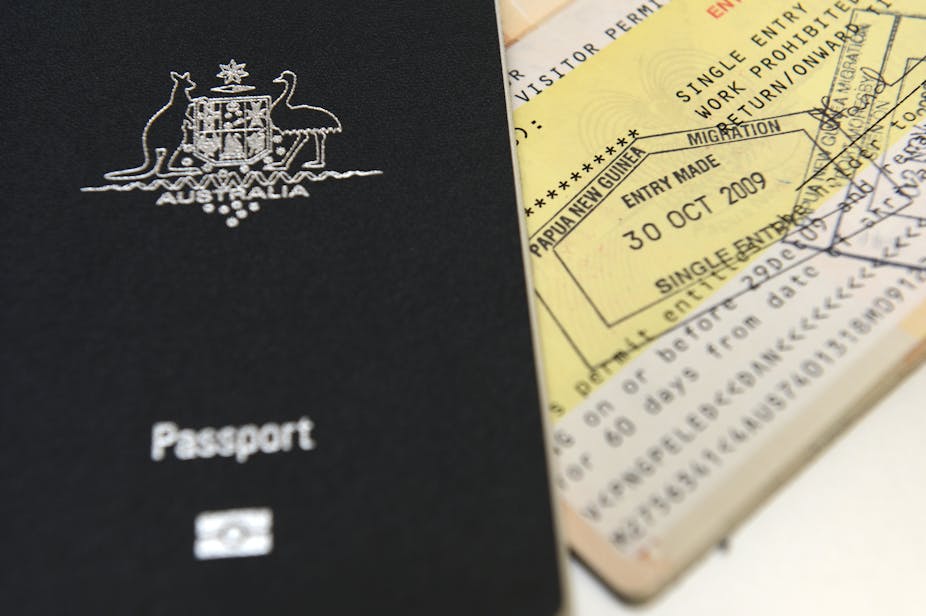The report on the 2014 Scanlon Foundation Mapping Social Cohesion surveys, released on Wednesday, finds both continuity and change. On attitudes to asylum seekers, for example, there is a large measure of continuity. While there has been some weakening of strongly held views, those supporting eligibility for permanent settlement for boat arrivals remain a minority. Just 24% of those surveyed were in favour.
Analysis using eight variables (gender, state of residence, region, age, education, financial situation, intended vote and region of birth) finds support for permanent settlement above 35% in just one sub-group: those intending to vote Greens (64%). There is a significant gap in the Australian community between mainstream opinion and Greens and advocacy groups.
While some commentators continue to hold the view that Australian bigotry – a legacy of White Australia – explains attitudes to asylum seekers, the level of support for permanent resettlement is lower among Australians born overseas of non-English-speaking background (21%) than the Australian-born (25%).
The 2014 findings on immigration come as a surprise. There was an expectation, in the context of rising unemployment and economic concerns, that negative views on immigration would increase – yet the reverse has occurred. Just 35% consider that the intake is “too high” (the lowest proportion of the seven Scanlon Foundation national surveys), while 58% agree that it is “about right” or “too low”.
This compares with 2014 American and European surveys that have found disapproval of government handling of immigration in the range of 60% to 75%.
A possible explanation for this low level of concern is the effectiveness of the government’s measures to stop asylum seekers arriving by boat. This success has conveyed the message that the government has effective border control measures and can be trusted to manage immigration.
Questions on the Australian political system continue to find low levels of respect for politicians, political parties and parliament. Again contrary to past trends, there was little evidence of a honeymoon period in the first year of a new government.
In response to the open-ended question “What is the most important problem facing Australia today?”, quality of government and politicians was ranked second, after the economy. A new question in the 2014 survey asked if the Australian political system works well. Just 15% indicated that it “works fine as it is”; 48% considered that it needs minor change; while 34% indicated “major change” or that it “should be replaced”.
In the context of concerns over the domestic repercussions of conflict in Syria and Iraq, an additional survey of 500 new respondents, comprising 12 questions chosen from the original survey in June-July, was conducted by telephone in October. The objective was to establish the extent and nature of any attitudinal shift over the last three months.
The survey found no change to the highly positive original findings on attitudes to immigration and multiculturalism. For example, 85% of initial respondents agreed that “multiculturalism has been good for Australia”. In October, it remained steady in terms of statistical significance at 81%.
Attitudes to faith groups have largely been consistent since 2011. Negative sentiment towards those of the Muslim faith has been relatively high across the years. While 5% or fewer respondents have indicated that they are “very negative” or “negative” towards Christians or Buddhists, close to 25% feel this way about Muslims. This pattern continued in the October survey, but without increase in the proportion negative towards Muslims.
However, significant change between June-July and October was found in the ranking of the main problems facing Australia, in level of identification with Australia, and in trust in the federal government.
In the ranking of problems, concern over the quality of government dropped markedly. National security, terrorism and defence issues – and what may be seen as a juxtaposed issue, concern over racism – emerged as prominent in October. Trust in the federal government increased from 26% to 36%, the highest proportion since 2009.
In response to the proposition that “in the modern world, maintaining the Australian way of life is important”, the level of “strong agreement” rose from 49% in June-July to 71% in October. Sense of belonging in Australia “to a great extent” increased from 61% to 73%.
This selection of results from the report points to the complexity of drivers of Australian opinion. It is a complexity that defies simple categorisation. While increased level of trust in government in a time of security concern and heightened nationalism conforms to expectations, the lack of change in attitudes towards Muslim Australians and continuing high levels of support for multiculturalism and immigration provide scope for reflection.

